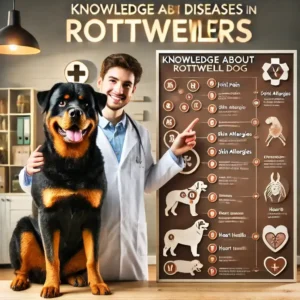Heart Disease in Dogs: Rottweiler heart disease prevention
Rottweilers are solid and steadfast mutts but can have heart issues like individuals. Heart maladies in Rottweilers can be slippery, appearing with no signs until genuine heart problems develop. Rottweiler Heart Disease Prevention? Understanding the signs of a heart murmur and heart failure is essential. Knowing what to look for and how to keep their hearts solid can assist your hairy companion to live a longer, more joyful life.
Key Takeaways
Rottweiler Heart Disease Prevention

Typical Types of Heart Disease in Rottweilers
Rottweilers, as a dog breed, are prone to a few heart conditions, including subaortic stenosis (SAS) and dilated cardiomyopathy (DCM), which can lead to an enlarged heart. These disorders can be genuine and regularly require customary checking to oversee successfully.
Indications to Observe For
It’s imperative to recognize the signs of heart illness early.
Common Signs include:
- Hacking
- Trouble breathing
- Weaknesses
- Swooning
Significance of Early Location
Early location of congenital heart issues is significant for overseeing heart illness in Rottweilers. Ordinary cardiac screenings, such as electrocardiography (ECG) and ultrasonography, can help recognize issues a few times as they are late and finish up genuine. Typical cardiac screenings can help capture issues early, advancing the chances of viable treatment.
Early diagnosis and treatment can improve Rottweiler’s quality of life with a heart infection.
Heart Disease in Rottweilers: What You Need to Know
Heart disease is a common health issue in dogs, including Rottweilers, and can significantly impact their quality of life. One of the most serious conditions they may face is dilated cardiomyopathy (DCM), where the heart becomes enlarged and struggles to pump blood effectively. This can lead to congestive heart failure if not addressed in time.
Common signs of heart disease in dogs include fatigue, difficulty breathing, coughing, and a reduced ability to exercise. Early detection is key—regular vet checkups can help diagnose heart problems before they worsen. To support your Rottweiler’s heart health, provide a nutritious diet recommended by your veterinarian and maintain a healthy weight for your dog.
Preventing heart disease and addressing symptoms early can help ensure your Rottweiler lives a long and happy life.
Hereditary Variants in Rottweiler Heart Illness
Part of Hereditary Quality in DCM
Dilated cardiomyopathy (DCM) can be a genuine heart condition that affects numerous Rottweilers. Hereditary factors are vital in improving DCM, even though the precise instrument remains hazy. Heart muscle cells in the affected pooches have a diminished capacity to contract properly.
This may be due to absconds in cell structure, proteins, or vitality components that affect blood flow. While the hereditary quality of DCM in Rottweilers has not entirely been caught on, it is suspected to be caused by an autosomal dominant design, meaning puppies with at least one duplicate of the mutant quality are likely to be affected.
Breeding Contemplations
Breeding choices are crucial in overseeing the hazard of DCM. Currently, no hereditary tests are available to distinguish carriers or affected pooches with heart disease in dogs. Be that as it may, breeding puppies with signs of DCM in their early stages is suggested to be avoided.
Annual screening through ultrasound and Holter ECG checks can help recognize heart peculiarities early. This proactive approach may help diminish the recurrence of DCM in future periods and improve overall heart health in dogs.
Current Investigation on Hereditary Testing
Investigations are continuing to create hereditary tests for DCM in Rottweilers. Such tests would be invaluable for distinguishing influenced pooches and anticipating them from breeding.
Until these tests are accessible, customary well-being screenings and careful breeding hones remain the leading techniques for overseeing this genetic condition.
Demonstrative Instruments for Heart Illness in Rottweilers
Ultrasonography
Ultrasonography is the foremost instrument capable of looking at the heart’s structure and work, crucial for diagnosing valve disease. It measures the heart muscle’s thickness, the chambers’ size, and the valves’ position and development.
Using color-flow ultrasonography, measuring the speed and heading of the bloodstream within the heart and the excellent vessels is possible.
Ultrasonography empowers nitty gritty estimation of the heart’s structure, giving pivotal data for the conclusion of heart disease in dogs.
Electrocardiography (ECG)
Electrocardiography (ECG) records the electrical activity of the heart to help identify potential heart problems. This test can recognize clinical signs of heart disease without a doubt a few times as late signs appear. A flexible contraption called a Holter monitor can be strapped to the puppy to record the heart’s electrical activity over an extended period. This makes a difference in distinguishing discontinuous issues that may be missed amid a short-term ECG, especially in dogs with heart disease.
Holter Check
Holter observation includes employing a convenient ECG gadget that records the heart’s electrical movement over 24 hours or more. This strategy is useful for identifying unpredictable heartbeats that happen occasionally. Holter’s perception gives a more comprehensive look at the heart’s work than a standard ECG.
Wholesome Procedures for Heart Wellbeing
Basic Nutrients
Feeding your Rottweiler with a balanced diet is imperative for keeping up heart prosperity. Taurine and Omega-3 Oily Acids are crucial supplements that must be included in their diet.
Taurine, an amino acid, supports heart function, while Omega-3 Oily Acids, found in plant oil, help lessen irritation and make strides in cardiovascular health.
Dietary Supplements
Certain dietary supplements can be advantageous in expanding to an adjusted slim-down. These may incorporate carnitine and taurine supplements, especially critical for breeds inclined to heart disease.
Continuously counsel your veterinarian sometime recently, including any supplements to your dog’s count calories.
Bolstering the Rules
To avoid heart infection and damage to the heart, it’s critical to follow legitimate nourishing rules. Maintain a strategic distance from high-fat, salty nourishments that can contribute to weight pick-up, high blood weight, and high cholesterol, all chance factors for heart illness.
Instead, take high-quality puppy nourishment that meets your pet’s dietary needs. Frequently screen your dog’s weight and alter their slim down to preserve a solid weight.https://www.pinterest.com/pin/994380792724986143/
Wholesome Strategies for Heart Prosperity
Principal Supplements
Reinforcing your Rottweiler, a balanced diet, is essential for keeping up heart prosperity. Taurine and Omega-3 Oily Acids are fundamental supplements that must be included in their diet.
Taurine, an amino acid, supports heart function, while Omega-3 Fatty Acids, found in the plant oil, help decrease aggravation and improve cardiovascular health.
Dietary Supplements
Certain dietary supplements can be profitable in developing a balanced check of calories. These may join carnitine and taurine supplements, particularly basic for breeds slanted to heart contamination.
Ceaselessly advise your veterinarian a few times as of late, counting any supplements to your dog’s diet.
Reinforcing Rules
It’s fundamental to require after-fitting no-follows to avoid heart disease in dogs. Sidestep high-fat, salty foods that can contribute to weight pick-up, high blood pressure, and high cholesterol, are all chance variables for heart disease.
Instead, slant toward high-quality dog food that meets your pet’s dietary needs. Routinely screen your dog’s weight and modify their count of calories to protect a substantial weight, reducing the risk of mitral valve disease.
Workout and Way of Life Alterations
Reasonable Workout Plans
Workout is principal for Rottweilers, but striking an altar is basic to prevent heart disease in dogs. As well, too much strain on a dog’s heart can also cause issues. Points for coordination work out like strolling or light running. Avoid high-intensity workouts, especially on occasions when analyzed with heart contamination.
Watching Physical Activity
Keep a close eye on your Rottweiler’s movement levels. Utilize a journal or an app to track each day’s workout. Look for signs of fatigue or inconvenient breathing, and alter the arrangement as required. Standard check-ups adjacent to your vet can help you tailor the workout to your dog’s needs.
Way of life Changes for Impacted Mutts
For Rottweilers with heart ailments, way-of-life changes are crucial. I obligate myself strenuously to work out and deliver a calm environment. Ensure your puppy has a comfortable place to rest and avoid obnoxious circumstances that could lead to heart problems.
These changes can, inside and out, move forward with your dog’s quality of life.
Restorative Organization and Treatment Choices

Drugs for Heart Ailment
Directing heart disease in Rottweilers regularly incorporates a combination of drugs. Each day, drugs can significantly move forward with the quality of life and life expectancy of mutts with heart failure.
Here are several joint arrangements utilized:
- Proficient Inhibitors: Drugs like enalapril and benazepril assist in decreasing blood volume and weight, calming the heart’s amplification.
- Inhibitors: Pimobendan could be a more current lesson on heart pharmaceuticals that brings down weight in both courses and veins even though it makes strides in heart muscle quality.
- Diuretics: This helps manage fluid conglomeration around the lungs.
- Beta-blockers: These reduce signs of heart failure and advance the dog’s quality of life, particularly in dogs with heart disease.
- Digoxin: This steadily increases cardiac surrender by making strides in the heart’s capacity to contract.
Surgical Trade
In a couple of cases, surgical medications may be crucial. Pacemakers are routinely utilized for energetic pooches born with natural heart deserts. Be that because it may, they are not endorsed for more prepared mutts due to the thrust of the technique.
Standard Veterinary Check-Ups
Planning prosperity screenings is crucial for early disclosure and organization of heart disorders. Standard check-ups permit blessed alterations in treatment plans and offer assistance in screening the ampleness of courses of action. Blood and urine tests can also be utilized to assess liver and kidney function, which are habitually blocked by heart affliction.
Conclusion
Ultimately, preventing heart disease in Rottweilers involves a combination of regular check-ups, a good diet, and good exercise. Although some parts, such as natural ones, we do not control, finding the location through methods such as ultrasound and Holter can be very helpful.
Rottweiler owners can help their pets live a long, productive life by being careful and working with veterinarians to prevent heart failure.
Frequently Asked Questions
Rottweilers regularly endure Expanded Cardiomyopathy (DCM), influencing the heart’s capacity to pump blood. They can, too, create other heart issues like valve issues and arrhythmias.
Observe for indications like hacking, trouble breathing, weariness, and blacking out. If you note any of these signs, see a vet immediately.
Vets utilize apparatuses like ultrasonography, electrocardiography (ECG), and Holter checking to check the heart’s structure and work.
Yes, hereditary qualities can play an enormous part in heart illness, particularly DCM. Be that as it may, the precise hereditary causes are still being considered.
Bolster them to eat less with essential supplements, guarantee they get standard workouts, and take them for scheduled vet check-ups. Maintain a strategic distance from over-exercising and pushing.
Yes, medicines can incorporate drugs, way of life changes, and some of the time surgery. Standard vet visits are vital to oversee the condition successfully.











